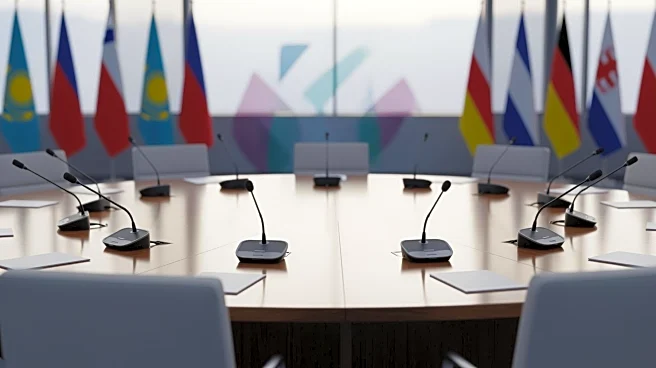What's Happening?
South African President Cyril Ramaphosa announced that there was an overwhelming consensus among G20 leaders for a summit declaration, despite the absence of the United States. The declaration was drafted
without U.S. input, which a senior White House official criticized as 'shameful.' The draft includes references to climate change, a point of contention with the administration of President Trump, who has expressed skepticism about the scientific consensus on human-caused global warming. Ramaphosa emphasized the importance of adopting the declaration and thanked delegations for their cooperation in producing a significant outcome document for the first African G20 presidency.
Why It's Important?
The consensus achieved at the G20 summit highlights the ability of international leaders to collaborate on global issues despite political disagreements. The inclusion of climate change in the declaration signifies a commitment to addressing environmental challenges, which could influence global policy and economic strategies. The U.S. boycott underscores tensions in international relations, particularly regarding climate policy, and may affect future diplomatic engagements. The successful drafting of the declaration without U.S. participation demonstrates the potential for other nations to lead on critical issues, potentially shifting the balance of influence in global governance.
What's Next?
The adoption of the G20 summit declaration may lead to increased international cooperation on climate change and other global challenges. Countries involved in the summit could implement policies aligned with the declaration's goals, potentially impacting international trade, environmental regulations, and diplomatic relations. The U.S. may face pressure to engage more constructively in future international discussions, especially as other nations take the lead on pressing global issues. The outcome of the summit could also influence upcoming international meetings and negotiations, setting a precedent for collaboration without U.S. involvement.
Beyond the Headlines
The G20 summit's developments may have long-term implications for global leadership dynamics. As countries like South Africa take on prominent roles in international forums, there could be a shift towards more inclusive and diverse leadership in global governance. This may encourage other nations to assert their influence and contribute to shaping international policies. The focus on climate change in the declaration could also drive innovation and investment in sustainable technologies, impacting industries worldwide. The event highlights the evolving nature of international diplomacy and the potential for new alliances and partnerships.









